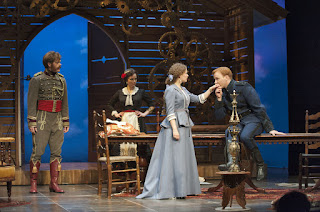A Review of Shaw's Arms and the Man
By no
means I consider myself to be a great critic, however the first read of the play
was an underwhelming experience for me. Perhaps I had mistaken the play for Major
Barbara, silly me. Either way after putting my thoughts together I have tried
to jot down an unbiased review of Shaw’s play Arms and The Man.
Synopsis (skip if you do not like spoilers)
It
is the year 1885 in Bulgaria, and a young Raina Petkoff is rejoiced as she hears
that her fiancé, Major Sergius, who is fighting at the Serbian front has
succeeded a cavalry charge against the enemy. As she romanticizes him for his
nobility and bravery, news comes that the Serbs have retreated to their town,
and a battle torn soldier finds refuge in her room. Although she was repulsed
by his manners at first, she grows curious and fond of his nature, offering him
refuge and food. The man explains how Sergius had led an almost suicidal move
and was successful only by luck. Later after learning the relationship between
Sergius and Raina, he duly apologizes and falls asleep in her bed. She and her
mother Catherine provide him a safe passage and this is overheard by the maid,
Louka. Later after the war is over Sergius returns home where Raina’s father,
Petkoff is surprised as Sergius wishes to resign from the ‘cowardly act of soldiering’.
Later we realize that Sergius has an affection towards Louka, and when the Man,
Bluntschli comes to return the coat which Raina had given him, we learn that he
had liked Raina who had offered her chocolate cream confectionery. In an unexpected
turn of events, we learn the true nature of Bluntschli, and Sergius and they
get engaged to their true loves.
--------------------
Now
although the plot felt a bit contrived as you’d expect in a comedy, the ideas
put forward by Shaw juxtaposing marriage and war are intriguing. As seen the
beginning we are introduced to a noble picture of Sergius from the perspective
of Raina. However, from Bluntschli we learn that he had committed an almost
blunder by charging towards the Serbian forces, but was saved by their lack of
ammunition. The escaped soldier, was a firm opportunist who took every chance
not to engage in conflict if he could help it. In the latter act we see that
both the celebrated veterans Sergius and Petkoff are too lethargic and
absolutely clueless about the art of war that Bluntschli has to help them. Noble
and romantic ideas of heroism and brevity are merely facades while the war-torn
hero would always wish for no war if it were a choice.
As for
marriage and class system, we slowly learn the position of the Petkoff family
in society is only by a show of wealth and snobbery. Side characters do an effective
role in pointing out the follies of the Petkoff family. While they consider
themselves to be the more refined part of the society, they seem more indifferent
to the true nature of war; its casualties and consequences.
Shaw is by no means a Shakespeare, but there
is a simple elegant flow of events, the utility and purpose-built characters
and the effortless means of storytelling that I find interesting. Although in
today’s world we are tired of the tropes of reversal of the true nature of our
heroes and villains, I would imagine it was a powerful tool in convincing the
Victorian audience the reality behind the forced pretentions of human nature as
well the nature of war itself.
Overall, I would
definitely recommend a quick read of the play. The reading is seamless and although
the story is simple it is interesting to see the story unravel itself as is
goes forward. Although there aren’t particularly noble characters to side with,
there are definitely moments of subtle levity.
Let me know your thoughts dear reader!
Until next time
Lan




Very engaging narrative...
ReplyDelete